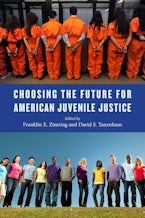Choosing the Future for American Juvenile Justice
This
is a hopeful but complicated era for those with ambitions to reform the
juvenile courts and youth-serving public institutions in the United States. As advocates plea for major reforms, many fear the public backlash in
making dramatic changes. Choosing the Future for American Juvenile Justice
provides a look at the recent trends in juvenile justice as well as suggestions
for reforms and policy changes in the future. Should youth be treated as adults
when they break the law? How can youth be deterred from crime? What factors
should be considered in how youth are punished?What role should the police have in schools?
This essential volume, edited by two of the leading
scholars on juvenile justice, and with contributors who are among the key
experts on each issue, the volume focuses on the most pressing issues of the
day: the impact of neuroscience on our understanding of brain development and
subsequent sentencing, the relationship of schools and the police, the issue of
the school-to-prison pipeline, the impact of immigration, the privacy of juvenile records, and the need for national
policies—including registration requirements--for juvenile sex offenders. Choosing
the Future for American Juvenile Justice is not only a timely collection, based
on the most current research, but also a forward-thinking volume that
anticipates the needs for substantive and future changes in juvenile justice.
Contributor Bios
Reviews
"After two decades of & get-tough policies that repudiated the original idea that & children are different, Choosing the Future for American Juvenile Justice provides an important and timely antidote. The essays examine both how politicians forgot juvenile courts founding principles and explore policy directions for the future. This outstanding collection by leading scholars examines important, but seldom addressed issues and concludes with a course of action for sensible policy reforms." ~ Barry Feld,author of Kids, Cops, and Confessions: Inside the Interrogation Room
"This is an extraordinary volume. The contributors do more than remind us of the importance of the juvenile court to jurisprudence in America and elsewhere in the world. They give us nuanced directions on how to re-establish a juvenile justice system that is effective, fair, rational and developmentally appropriate." ~ Robert G. Schwartz,Executive Director, Juvenile Law Center, and co-editor of Youth on Trial
"Zimring and TanenhausChoosing the Future for American Juvenile Justiceis a significant contribution to the study of adolescents. It provides a wealth of data and sharpens the argument for the immediate need to enact progressive reforms in the juvenile justice system." ~ J Youth Adolescence
"Categorized as a volume addressing criminology and law, this book has value beyond so narrow a scope. Indeed, it should be required reading for school administrators and board members, teachers-in-training, and youth advocates of all stripes, that these professionals might reconsider the implications of such practices as policing schools with school resource officers and feeding the school-to-prison pipeline." ~ Voya Voice of Youth Advocates
 This work is licensed under a
Creative Commons Attribution-NonCommercial-ShareAlike 4.0 International License
(CC BY-NC-SA).
This work is licensed under a
Creative Commons Attribution-NonCommercial-ShareAlike 4.0 International License
(CC BY-NC-SA).


